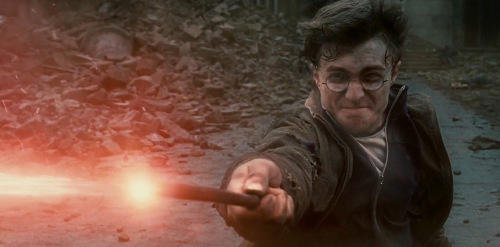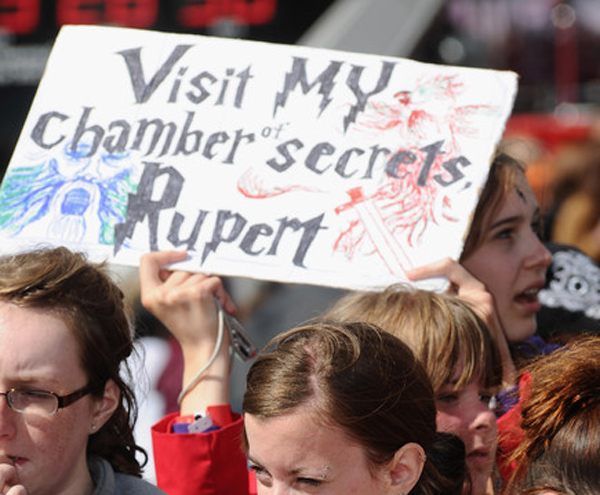The End of Harry Potter and What it Means for Fandom
Finite Incantatem. And so the Harry Potter series comes to a cinematic end in a little more than 24 hours, as midnight screenings of Harry Potter and the Deathly Hallows: Part 2 start up around the world. No more multi-hour line-ups outside theatres dressed as favourite characters, no more fervent anticipation of the latest installment of CGI magic and brooding teen wizards. I’m left with the same bittersweet reaction of most fans, but what I’m more interested in is what we can take away from the past 14 years of novel and film releases. What does the diehard nature of the Harry Potter fan community say about the quality of the series and the fans themselves?
I believe fans should be actually be congratulated. You showered the film studios and associated businesses with ticket sales, and held the filmmakers to account for deviating from the source text. You probably deserve as much credit for keeping the series alive as the creators. That’s why the Harry Potter series is a notable milestone in the way people respond to media – film adaptations in particular.
We’ve been hearing a lot recently on the subject of the “end of Harry Potter” in the media. Of course, as an aspiring media critic, I wanted to add my thoughts to the mix. At first, I wanted to take the curmudgeon’s stance, and say that Harry Potter really isn’t ending; that the property will live on in the way other series like Star Wars have, through merchandise and spinoff projects. But that argument ignores all the positive results of the Harry Potter novels and movies. Not only has the film series acted as a beneficial cash injection for filmmakers in a time of industry upheaval, but the property as a whole has entertained millions upon millions (perhaps billions?) of people.
It’s a bit phenomenal from a big-picture point of view. You’ve all heard the pundits exclaim how amazing it is that a then-single mom straddling the poverty line in England could come up with such a rich (and resonant) literary world, et cetera. But consider the movies: from a cinematic perspective, they’re nothing wildly special. While the films are a solid set of adaptations, they do have some pacing issues, continuity errors and even some flat acting. What keeps the movies on a constant “A” level is the power of the franchise - or in other words, the dedication of the fans.
When you talk to a hardcore fan of the series, they’ll give you their own take on the movies: which ones were better than the others, what they hated about a certain installment, or (more likely at the moment) how excited they are for Deathly Hallows: Part 2. It’s people like this who have kept the movies coming year after year. When a film studio has Harry Potter-level revenues ($6.3 billion so far), how could they turn down the idea of making another? What will stick with me, though, goes beyond the statistics. The legacy of the Harry Potter series won’t simply be the books and DVDs on shelves, but the memories of the social aspect of the series: the public demonstrations of Harry Potter fandom.
I used to work in a movie theatre, carrying out all the typical duties of serving popcorn behind the counter and patrolling theatres as an usher. I will never forget the nights when Harry Potter movies premiered (I worked through about three Potter film releases). We would arrive for our evening shifts, and cordoned-off areas of the multiplex would already be filled with bespectacled fans clutching toy wands and wearing Hogwarts scarves. These fans would wait for hours upon hours for the midnight show to begin, and would pass the time by playing Potter-themed boardgames on the floor or watching previous Potter movies on portable DVD players. You might expect there to be a lot of frayed nerves as everyone jockeyed for a spot in line, but the Potter crowds always conveyed an air of happy expectation – and the energy would even extend to us, the beleaguered part-time workers.
It’s this kind of positive atmosphere that I think most people will remember about the Potter series once it is officially “over”. From a film buff’s perspective, it’s encouraging to know that the film medium can still generate this kind of response. On another level, it makes a lot of sense that the Potter films have a social power over us – not only do they hinge upon the classic good vs. evil dynamic, but they have spawned a complete community of fans who will now go on to attach themselves to future fantasy series. This will launch an entirely new cycle of fan appreciation and some real-life social networking – usually in the line-up of the latest film adaptation.
So, go on: weep for the end of the Harry Potter series. Indulge in a bit of (hopefully) harmless fanboy/fangirling. Keep in mind, however, what you’re really upset about may not be the release of the final film, but the end of a magical, social experience. Now, where did I put my plastic wand?
-
What does the end of the Harry Potter series mean for you? Do you agree that the social component of Potter fandom is as important as the series itself? Is the whole thing a bit tired at this point? Share your reaction in the comments section below! If you’re still in a Potter-themed mood, check out some of my related articles:


